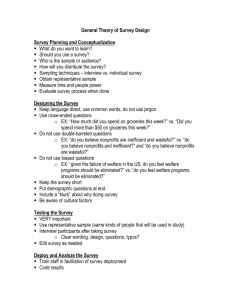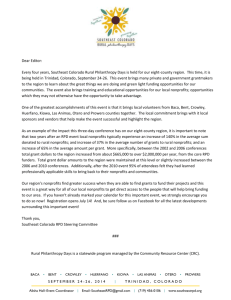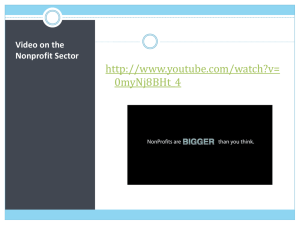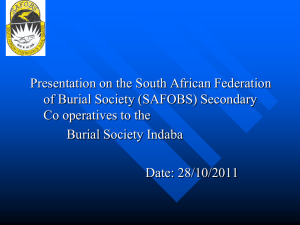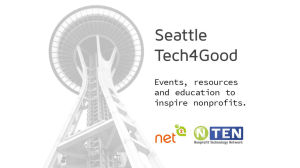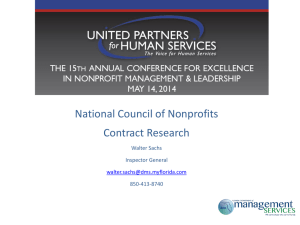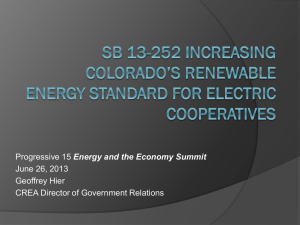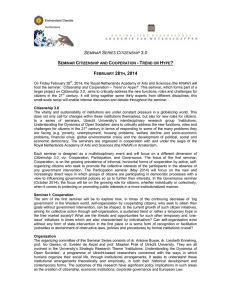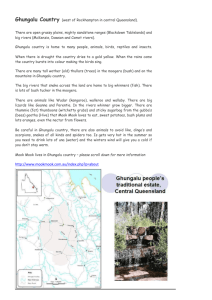Ontario Institute for Studies in Education of the University of Toronto
advertisement
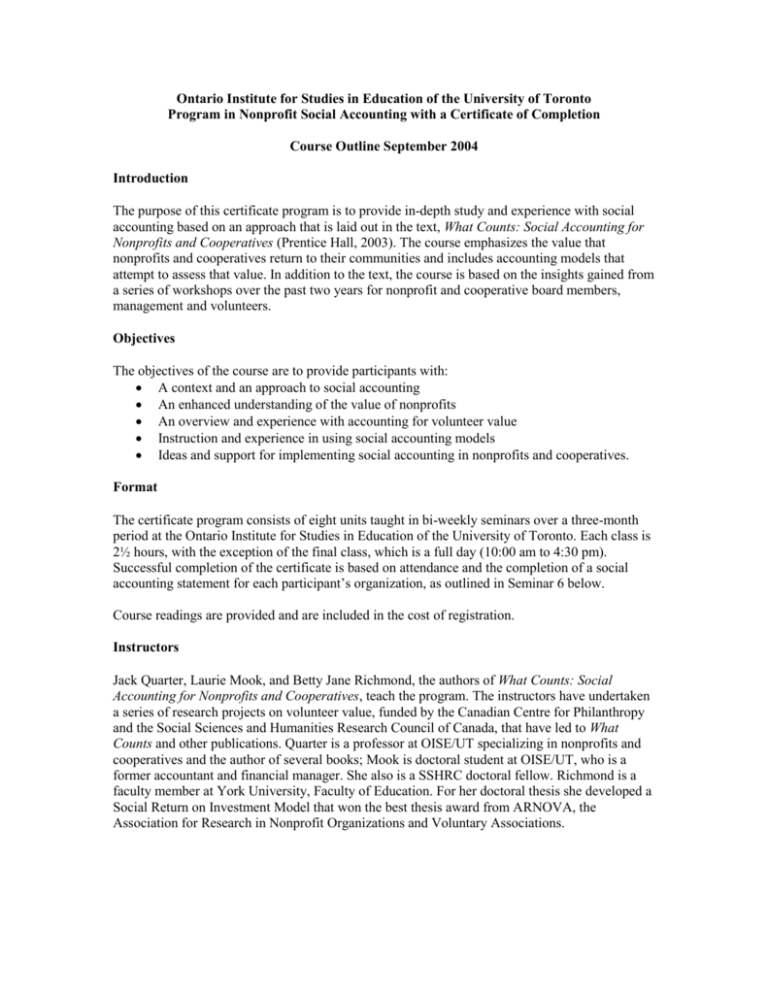
Ontario Institute for Studies in Education of the University of Toronto Program in Nonprofit Social Accounting with a Certificate of Completion Course Outline September 2004 Introduction The purpose of this certificate program is to provide in-depth study and experience with social accounting based on an approach that is laid out in the text, What Counts: Social Accounting for Nonprofits and Cooperatives (Prentice Hall, 2003). The course emphasizes the value that nonprofits and cooperatives return to their communities and includes accounting models that attempt to assess that value. In addition to the text, the course is based on the insights gained from a series of workshops over the past two years for nonprofit and cooperative board members, management and volunteers. Objectives The objectives of the course are to provide participants with: A context and an approach to social accounting An enhanced understanding of the value of nonprofits An overview and experience with accounting for volunteer value Instruction and experience in using social accounting models Ideas and support for implementing social accounting in nonprofits and cooperatives. Format The certificate program consists of eight units taught in bi-weekly seminars over a three-month period at the Ontario Institute for Studies in Education of the University of Toronto. Each class is 2½ hours, with the exception of the final class, which is a full day (10:00 am to 4:30 pm). Successful completion of the certificate is based on attendance and the completion of a social accounting statement for each participant’s organization, as outlined in Seminar 6 below. Course readings are provided and are included in the cost of registration. Instructors Jack Quarter, Laurie Mook, and Betty Jane Richmond, the authors of What Counts: Social Accounting for Nonprofits and Cooperatives, teach the program. The instructors have undertaken a series of research projects on volunteer value, funded by the Canadian Centre for Philanthropy and the Social Sciences and Humanities Research Council of Canada, that have led to What Counts and other publications. Quarter is a professor at OISE/UT specializing in nonprofits and cooperatives and the author of several books; Mook is doctoral student at OISE/UT, who is a former accountant and financial manager. She also is a SSHRC doctoral fellow. Richmond is a faculty member at York University, Faculty of Education. For her doctoral thesis she developed a Social Return on Investment Model that won the best thesis award from ARNOVA, the Association for Research in Nonprofit Organizations and Voluntary Associations. OISE/UT Social Accounting Certificate Program 2004 2 Seminars 1. September 20: Orientation to Social Accounting and the Program What is Social Accounting? This seminar goes into the history of social accounting and addresses its fundamental principles. Readings for this class: Quarter, Jack, Laurie Mook & Betty Jane Richmond. 2003. What Counts: Social Accounting for Nonprofits and Cooperatives. Upper Saddle River, NJ: Prentice Hall, Ch. 1. 2. October 4: Volunteers Across Canada What Is a Volunteer? Although the definition of volunteering may seem self-evident, in fact there are debates in the literature on this issue. These debates will be examined, as well as the debates on placing a value on volunteer contributions. Also, a social economy framework will be presented to better understand nonprofits and other social organizations within this context. Readings for this class: Cnaan, Ram, Femida Handy, and Margaret Wadsworth. 1996. Defining Who is a Volunteer: Conceptual and Empirical Considerations. Nonprofit and Voluntary Sector Quarterly 25 (3): 364383. Hall, Michael, Larry McKeown, and Karen Roberts. 2001. Caring Canadians, Involved Canadians: Highlights from the 2000 National Survey of Giving, Volunteering and Participating. Ottawa: Minister of Industry. What Counts: Social Accounting for Nonprofits and Cooperatives, Ch. 2. Supplementary: Quarter, Jack, Laurie Mook & Betty Jane Richmond. 2003. What is the Social Economy? Centre for Urban and Community Studies Research Bulletin #13. Toronto: University of Toronto. 3. October 18: Record-keeping and Valuing of Volunteer Contributions This seminar examines practical procedures for keeping records of volunteer contributions. It explores ideas for estimating and assessing value for organizational inputs and outputs. It also discusses three different variations of replacement costs (generalist, specialist, modified specialist) for attributing a value to volunteers. Readings for this class: What Counts: Social Accounting for Nonprofits and Cooperatives, Ch. 8. Mook, L. & J. Quarter. 2004. How to Assign a Monetary Value to Volunteer Contributions: A Manual. Toronto: Canadian Centre for Philanthropy. 2 OISE/UT Social Accounting Certificate Program 2004 3 4. November 1: Attributing Value to Social Outputs not Exchanged on the Market and Accounting Frameworks – Part 1 This seminar discusses social outputs that are not exchanged on the market and looks at techniques for attributing to them a comparative market value. The Community Social Return on Investment social accounting framework will also be presented. Readings for this class: What Counts: Social Accounting for Nonprofits and Cooperatives, Chs. 3 & 4, and excerpts from other chapters. 5. November 15: Accounting Frameworks—Part 2 This seminar deals specifically with the Expanded Value Added Statement. This is an adaptation of a conventional Value Added Statement, and uses a combination of financial and social data. Readings for this class: What Counts: Social Accounting for Nonprofits and Cooperatives, Chs. 6 & 7. Quarter, J., L. Mook, and B.J. Richmond. 2002. What Volunteers Contribute: Calculating and Communicating Value Added. 2002. Toronto: Canadian Centre for Philanthropy. 6. November 29: Accounting Frameworks—Part 3 Between seminars 5 and 6, the participants will create an Expanded Value Added Statement for their organization. In seminar 6, these statements will be shared with the group in class presentations and poster sessions. 7. December 13: Accounting Frameworks—Part 4 Two additional social accounting models will be presented: the Socioeconomic Impact Statement, and the Socioeconomic Resource Statement. Ideas for further development of social accounting models will be discussed. Readings: What Counts: Social Accounting for Nonprofits and Cooperatives, Ch. 5. Implementation Strategies This seminar will discuss strategies for implementation and obstacles to it. It will also discuss next steps in moving this work forward. There will also be a ceremony and closing lunch. Readings: What Counts: Social Accounting for Nonprofits and Cooperatives, Ch. 9. 3
